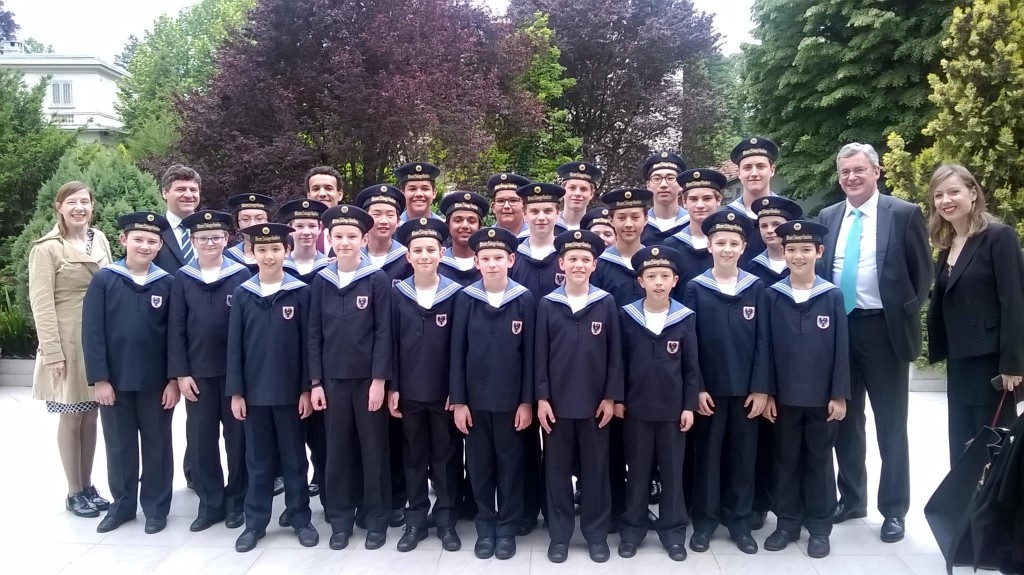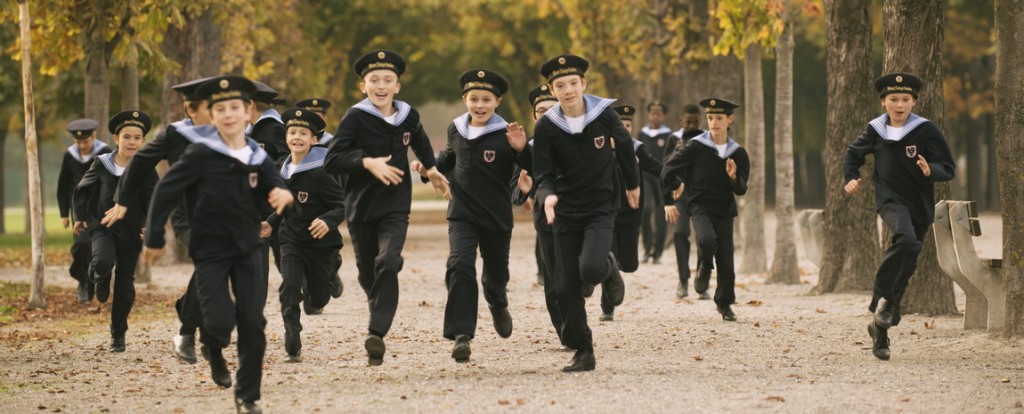World Famous Musical Sensation Vienna Boys’ Choir will be having a concert on the 21th of May at The Sava Centre organised by CEBEF! The Belgraders will have the tremendous opportunity to see them live!
Photo: Bemus Cebef
Vienna Boys’ Choir
Boys have been singing at the court in Vienna since the 14th century. In 1498, more than half a millennium ago, Holy Roman Emperor Maximilian I moved his court and his court musicians to Vienna. He gave instructions that there were to be six singing boys among his musicians; the boys came from different parts of the Holy Roman Empire, from the Netherlands, Italy, Germany, and Austria. Historians have settled on 1498 as the foundation date of the Vienna Chapel Imperial (Hofmusikkapelle) and, in consequence, the Vienna Boys’ Choir. Until 1918, the choir sang exclusively for the imperial court, at mass, concerts and private functions, and on state occasions.
Musicians like Wolfgang Amadeus Mozart, Antonio Salieri, Christoph Willibald Gluck, and Anton Bruckner worked with the choir. Brothers Joseph Haydn and Michael Haydn, members of the choir of St. Stephen’s Cathedral, frequently sang with the imperial boys’ choir.
In 1918, after the breakdown of the Habsburg Empire, the Austrian government took over the court opera, its orchestra and the adult singers, but not the boys’ choir. Josef Schnitt, who became Dean of the Imperial Chapel in 1921, turned the Vienna Boys’ Choir into a private instituion.The former court choir boys became the Wiener Sängerknaben (Vienna Boys’ Choir); the imperial uniform was replaced by the sailor suit, then the height of boys’ fashion. There was not enough money to pay for the boys’ upkeep, and the choir started to give concerts outside of the chapel in 1926, performing motets, secular works, and – at the boys’ request – children’s operas. The impact was amazing. Within a year, the choir performed in Berlin, Prague and Zurich. Athens and Riga (1928) followed, then Spain, France, Denmark, Norway and Sweden (1929), the United States (1932), Australia (1934) and South America (1936). Since 1926, the choir has clocked up close to 1000 tours in 100 different countries.
Present
Today there are 100 choristers from 30 different nations between the ages of ten and fourteen, divided into four touring choirs. Between them, the four choirs give around 300 concerts and performances each year in front of almost half a million people. Each group spends nine to eleven weeks of the school year on tour. They visit virtually all European countries, and they are frequent guests in Asia, Australia and the Americas.
Together with the members of the Vienna Philharmonic Orchestra and the men of the Vienna State Opera Chorus, the Vienna Boys’ Choir maintains the tradition of the imperial musicians: as Hofmusikkapelle (Chapel Imperial) they provide the music for the Sunday Mass in Vienna’s Imperial Chapel, as they have done since 1498. On January 1st, they performed at the traditional New Year concert in Vienna for the sixth time, with the Vienna Philharmonic Orchestra.
Photo: Bemus Cebef
Repertoire
The choir’s repertoire includes everything from medieval to contemporary and experimental music. Motets and lieder for boys’ choir form the core of the touring repertoire, as do the choir’s own arrangements of quintessentially Viennese music, waltzes and polkas by Lanner and Strauss.
Both the choir and the Chapel Imperial have a long tradition of commissioning new works, going back to Imperial times, when composers like Mozart, Haydn, or Bruckner wrote for the ensemble. The Vienna Boys’ Choir performs major choral and symphonic works, sometimes as part of the Hofmusikkapelle, sometimes with other orchestras and men’s choirs. In recent years, they have performed with the Vienna Philharmonic Orchestra, the Vienna Symphony Orchestra, the London Philharmonic, Staatskapelle Berlin, the Oslo Philharmonic and the Pittsburgh Symphony Orchestra, and are regularly asked to supply soloists for large choral and orchestral works.
The Choir School
The choir maintains its own schools. Almost 400 children and teenagers between the ages of 3 and 18 study and rehearse in the Augartenpalais, a baroque palace and former imperial hunting lodge in Vienna. Beginning with kindergarten, run in cooperation with the city of Vienna, boys and girls are provided with an all-round education. At age ten, the most talented boys are selected to join the choir and enter the choir’s grammar school. All boys are assigned to one of the touring choirs.
Academic lessons are taught in small groups. The school offers extracurricular activities ranging from all kinds of sports to attending a wide range of concerts, operas, plays, musicals and movies. All choir boys live in the choir’s well-appointed boarding school, with two to three boys sharing a room.
In 2010, the choir launched its new senior high school for boys and girls. The unique curriculum for years 8 to 12 was developed in conjunction with the Universities of Music in Vienna and in Salzburg; it is designed to help young singers fnd their voice and discover and develop their talents, and to prepare young singers for university and for a career in music.
Most students retain a lifelong commitment to the Arts. Roughly a quarter of the school’s alumni go on to become professional musicians, conductors, singers or instrumentalists. Almost all continue to sing. There are two male voice ensembles made up entirely of former choristers, the Chorus Viennensis and the Imperial Chapel’s Schola Cantorum, who specialises in Gregorian chant.
Development and Funding
The Vienna Boys’ Choir is a private, non-for-proft organisation, which finances itself largely through concerts, recordings and royalties. The Ministry of Education and the State’s Art Department help fund special projects, such as the production of new children’s operas. Further development and projects depend on additional support.
The POK Pühringer Privatstiftung, based in Vienna’s Palais Coburg is the choir’s general sponsor. With its backing, the choir was able to build its own on-campus concert hall to facilitate opera productions in particular. The hall opened in December of 2012, with a joint gala concert by the Vienna Boys’ Choir and the Vienna Philharmonic Orchestra. Its name, MuTh, stands for “Music and Theatre”. MuTh serves the entire community of Vienna with a wide range of acts, and there is special focus on giving a platform to young performers.
Luiz de Godoy was appointed one of the conductors of the Vienna Boys Choir in 2016 – he conducts one of the touring choirs both in Austria and on tour. Besides selecting the repertoire for his choir, and conducting the daily rehearsals, he prepares the choristers for the Sunday Masses at the Imperial Chapel, for appearances in the opera, recordings, and film shoots. His first major task with the boys was the production of “Der Bettelknabe (The begging boy)” in Vienna, a children’s opera by Gerald Wirth, written for the choir. To Mr de Godoy, music is one of the virtues of human life; something that can be taught and learned, something that helps us express ourselves, understand each other, and treat each other with respect. “It is vital to be exposed to music as early as possible,” he says.
De Godoy was born in Mogi das Cruzes, Brazil. As a choirboy in his hometown he learned to love music. He learned to play the piano at the music school of the opera house in São Paulo, and went on to study piano, choral and orchestral conducting, solo voice, and organ at the University of São Paulo and the Music University in Cologne, Germany. He holds a master’s degree in piano from the University of Applied Arts in Castelo Branco, Portugal. In 2009, de Godoy was one of twenty students from around the world selected as recipients of a scholarship for an exchange programme run by UNESCO, leading to studies and performances in Boston, Tanglewood, New York and Washington DC. In 2013, Luiz de Godoy matriculated at the Music University in Vienna, studying orchestral conducting with Simeon Pironkov and choral conducting with Erwin Ortner.
Luiz de Godoy began to perform professionally at an early age, as singer, pianist, and conductor. At the age of only fourteen, he served as a répétiteur in projects of the São Paulo opera house, working on choral concerts and on a wide range of operas, from works by Mozart to works by Weill. At 15, he went on stage as a pianist in Orff’s Carmina Burana. Later, he directed the Opera Studio of the „Música nas Montanhas“ Festival in Brazil. In addition to performing, de Godoy is active as music educator. In his home country, he has led classes for schoolchildren in solo singing and choir, as part of “Projeto Guri”, a major programme of the Brazilian government.
In 2010, de Godoy moved to Europe. He sang with the European Chamber Choir, Cologne; worked as assistent conductor in Melk, Lower Austria, and led a workshop on Brazilian choir music at the University of Vienna. He has also been working as assistant director of the women’s chamber choir Cantilena, and of Gumpoldskirchner Spatzen, an Austrian children’s choir, with whom he undertook tours to China and Germany. He continues to work as assistant to the artistic director of the prestigious Wiener Singakademie, collaborating with the likes of Gustavo Dudamel, Sir Simon Rattle, Valery Gergiev, and Simone Young.

